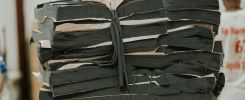The fashion industry does not have the best reputation when it comes to ethical production. In many areas of the world, where fashion is produced, people experience major amounts of social injustice. The people that live in these places make marginal minimum wages that rarely are sufficient to care for themselves and their families. There are many that are subject to slave labor and more that work in unsafe and unfair working conditions. When founding Allmade, we decided to make it better for those who were facing these situations. Allmade is committed to paying living wages and providing dignified work. Safe and comfortable working conditions is a fundamental right..
Minimum Wage Versus Living Wage
The minimum wage in the apparel industry in Haiti is 240 Gourdes, as of this writing approximately $2.40 per day. A living wage in Haiti, which is defined as a wage that is sufficient to pay for safe shelter, food, clothing, transportation, education and basic health care, is somewhere between 650 and 950 Gourdes, approximately $10-15 per day.
At LIFE, makers earn a living wage. Makers at LIFE are guaranteed to 600 Gourdes a day, even when there is no work, and routinely make 1000 Gourdes per pay. Which makes a material difference in breaking the poverty, poverty orphan cycle, and the advancement of the middle class in Haiti.
Slave Labor Versus Dignified Work
Cheap labor has always been a significant component of economic advantage and advancement. Cheap is often considered a primary differentiation. The race to cheap goods for US consumers has led to worsening conditions for workers and populations in developing countries.
When you think of slave labor, usually what comes to mind is the shanghaiing of sailors in the 1600s and the cotton field slaves that were ripped from their homes and families in Africa and transported under horrific conditions to the US and European shores to be shackled and physically enslaved for our benefit. That kind of slave labor, however hard to imagine, is still around. But slave labor is defined a little different these days. It mostly comes from fear, desperation and extreme property. Most slaves today are not physically restrained to stay in their workplace but even so, they don’t have the ability to move freely. Much of this, if not entirely, is our responsibility because of our demand for a cheap good.
The LIFE facility in Tabarre, Haiti, just on the outskirts of Port-au-Prince, where we cut & sew Allmade garments, is well lit, there’s lots of natural light and air flow, it is bright, clean and it is spacious. The personal workspace provided to each of the makers is greater than what I have seen and US-based Cut & Sew operations. All workers are provided ergonomically designed chairs and instead of sewing the same few inches of clothing for your entire career, workers are rotated on the line and throughout the factory facility to create variation in work. In addition to standard wages, workers are provided lunch, stipends for transportation, and grants towards basic and advanced education. LIFE is currently WRAP certified and in the process of obtaining Fair Trade Certification.
Working Conditions
In the apparel industry workers are crammed into tight and dark spaces. If they have seating, it is usually hard and uncomfortable. They work in the same unnatural position for hours on end.
We comply with all ethical working condition expectations. And, in many cases, we exceed the conditions that are prevalent in the United States. The building is a well constructed single story building. It has high ceilings, proper lighting, natural airflow, ergonomic chairs, modern sewing equipment, a good amount of personal workspace, and everything else that you might expect to find in a quality work environment.
In the back of the building is a common space or lunch area that is nicely shaded with umbrellas and flowering plants. In the front of the building is another well-designed garden space were makers can relax and socialize during breaks. The wall surrounding the garden was constructed from the rubble that resulted from the collapse of the main house on the property during the earthquake. it is now a functioning and beautifully designed reminder of the devastation that transpired and the recovery that is in progress.
On the last trip to Haiti, our representative from the company that we use for the dying and finishing of the fabric joined us. He has been in the industry for 30+ years, and has seen cut & sew facilities in all corners of the world. When he first set foot inside the LIFE facility, his jaw dropped on the floor. He had never seen such nice working conditions.
Help Us Make It Better
You can help us make it better for the apparel industry by becoming a social justice advocate. Spread the word about the problems apparel workers face and the work that Allmade is doing to fix the situation. Or even better, make the change to Allmade for all of your apparel needs. With your help, we will be able to expand Allmade past Haiti and help other countries around the world.


